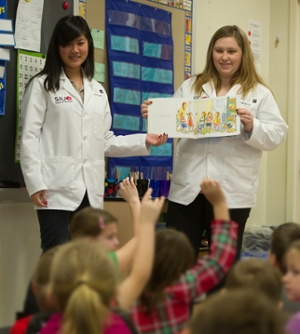 Southern Illinois University Edwardsville School of Pharmacy (SOP) first-year (P1) students are teaching more than 5,000 Pre-K through third grade students from Madison and St. Clair counties how to stay safe from potentially harmful items. Forty teams of SOP students are involved in the School’s annual service learning experience, presenting age-appropriate lessons on poison prevention Feb. 22-March 11.
Southern Illinois University Edwardsville School of Pharmacy (SOP) first-year (P1) students are teaching more than 5,000 Pre-K through third grade students from Madison and St. Clair counties how to stay safe from potentially harmful items. Forty teams of SOP students are involved in the School’s annual service learning experience, presenting age-appropriate lessons on poison prevention Feb. 22-March 11.
“The health and well-being of the community is improved by information and prevention just as much as disease state management and medication therapy,” said Jennifer Arnoldi, PharmD, clinical associate professor and experiential education coordinator in the SOP. “Encouraging our P1 students to work with young children helps establish important messages about health and safety early in life and provides for a positive bond with the community.”
The topic of poison prevention is important, as accidental exposure to toxic substances often found in common household items is common among young children. The presentations focus on teaching children how to spot possible dangers in the home, and to always ask an adult before touching or tasting something that has the potential to be hazardous.
“This experience has helped me become more comfortable working with younger individuals,” said Thien Nga Vu, SOP P1 student. “As a pharmacist, it’s important to be able to communicate with anyone, regardless of age, as we have the accessibility and knowledge to greatly influence health outcomes and positively impact the community.”
“I thoroughly enjoyed the children’s enthusiasm while presenting,” added P1 student Jasmine Bennett. “This experience helped me realize that it does not matter what you do if you don’t remember to give back to those in your community. It’s crucial for pharmacists to share their knowledge to help children and adults stay safe from dangers they would normally be unaware of.”
“While this opportunity helps pharmacy students further their ability to work with others, build communication skills and practice public speaking, the greatest benefit may come from the experience of breaking down a large, complex topic into an understandable and meaningful format for their audience,” Arnoldi said. “As future pharmacists, this skill is invaluable for communicating with patients about complicated disease states and medications.
“Most of our participating students find this experience extremely rewarding and can appreciate that even early in their schooling, they can have a significant impact on the community.”
Photo: SOP P1 students Thien Nga Vu (L) and Jasmine Bennett (R) read a book to a group of first grade students.